The special guest of this year’s ICON science fiction, fantasy and role playing convention, Bill Willingham is a longtime creator/writer/illustrator of comics, best known for creating and writing his on-going series Fables. Premiering in 2002 and going strong (as will become evident in the interview), Fables is the saga of a group of characters from all kinds of fairy-tales, fictions and folklore, who, after being forced out of their magical homelands by the evil Adversary, built a small community in New York City. It features dozens of characters from a vast variety of sources –The Big Bad Wolf, Snow White, Goldilocks, Blue Beard, Pinocchio, Aladdin, Cinderella, Beauty, Beast and many others- and, naturally, many corresponding villains (though occasionally the roles are reversed, and several character switch sides at certain points). There have been 89 issues released so far, and 12 books.
Mr. Willingham was gracious enough to sit down with Midnight East for an interview, which was conducted by Fables fan (and Midnight East contributor) Ze’ev Rosenstein and myself, also a Fables fan. The interview does contain rather major spoilers about the events of Fables described in books 1-11 (issues #1-#75). If you do read it and think you might be interested in Fables, don’t be off-put by the spoilers…the story revelations are just a part of what makes Fables so much fun and there’s no end in sight to the joys that have yet to be written or drawn.
The interview is a tad on the long side, but we were hesitant to cut too much, so as not to lose any of the wonderful stories, facts, factoids and tidbits that Mr. Willingham provided.
Shlomo Porat: I’m here as a film person- I’ve read Fables, as well as some other comics, I just wanted it to be clear that I’m not a natural ICON goer.
Bill Willingham: As opposed to all those natural ICON goers? I’ve seen many unnatural ICON goers.
SP: Just to be sure about the frame of reference.
BW: Okay.
Zeev Rosenstein: One thing about Fables is its phenomenal mass appeal. I mean, my mother, who has zero interest in comics, loves Fables. My girlfriend is an incredible comic person, and she introduced me to Fables.
BW: Good girlfriend- you should keep her.
SP: And the two of them introduced it to me, so…
BW: I’ve gotta tell you- we get a lot of that. You know- comics… the business itself is not that kind that we can afford to do things like demographics the way, you know, big media does. So we only have anecdotal information. But I hear that same story –or some variation on, you know- my mother always wondered why I liked these damn silly picture books, and finally I got her Fables, and finally she understands. We get a lot of ‘my girlfriend doesn’t read comics, but she reads this ‘, or ‘my girlfriend forced me to read this’. Those are great. But I got to tell you- my parents finally understand why I read comics. It’s not only breaking the gender barrier, but breaking through that generational barrier. Making sense of it to people’s parents and siblings….
ZR: It just seems like anyone can get Fables. There’s no barrier. If I want to read X-Men, I sort-of have to know tens of years of back-story, I have to accept a whole bunch of premises and ideas that there just isn’t in Fables.
BW: Yeah, to a certain extent. You absolutely don’t need to know who these characters are before the story begins. We’ve been doing it long enough that I’m beginning to worry whether my Fables story…you can’t just jump in at different stages. I mean, you can, because….-I was just about to say that this is America, and you can do what you want, but it’s not, so you can’t do what you want, you must do what I want. You can jump in anywhere, and eventually, you can figure it out. So I’m trying to make it a little less opaque to the readers. But certainly, if you picked up the series for the first time and started from the beginning, you don’t need any instructions on who these characters are. You know who they are; you’ve known who they are for, hopefully, a long time. And now you’re just finding out what they’ve been up to lately.
SP: One more thing for the record- we have read up to ‘War and Pieces’, the last one hasn’t gotten here yet.
BW: So I can’ spoil it for you!
ZR: Please don’t.
BW: Okay, I won’t.
SP: I have a basic bio-question, rather boring, but- how did you go from illustrating DnD to comics? What was the transition like?
BW: Well, you’re right: It is terribly boring, as is most of my life. Let me say one thing about that. If a writer doesn’t have a boring life, he’s doing it wrong, because the whole point is you need to be alone in that room, doing the work. If you’re not spending a lot of time alone in that room working and having a boring life, than you’re probably not having the career you could have. That said….I was in the army. I was in the army, because I wanted to do two things with my life that were contradictory: 1, I wanted to become a cop, because cops and robbers are fun and 2, I wanted to draw comic books, and I couldn’t decide. Well, I was in college and I thought ‘You know’ –my family is one in which you do your military service because you feel you owe something to our country. I always knew that- you could go to college first, you could enlist first, but you are going in to the army. So I knew I was doing that eventually. I found out that there was the Military Police, which was perfect. If you decided to become a cop, you kind of have to commit to it. You’re not going to go to the Police Academy, do it for a year, than quit. In the military, you’re in for three years, and you can discover if that’s what you want to do.
ZR: Is there a stigma towards Military Policemen in the US? Because in Israel there’s a huge stigma.
BW: Really? That’s the reaction I got when I said MP….Why?
SP: Most people see you as the guys at the bus stops checking if you’re properly dressed, and if you have your dog-tags on your neck….
BW: Oh, they hate us in the military as well for that. There is a stigma- people think of you as the hall-monitor, the kid who reminds the teacher that she forgot to assign homework. Yes, there is that. But they told me that I could get something approaching real police work, and I wanted to try it out. And I did, in the sense that…there’s also a stigma, of real policemen looking at security guards of mall-cops as pretenders. Civilian policemen look at military policemen in much the same way. Civilian police are often called ‘Pigs’- and of course they embrace that- ‘right, I know, we’re pigs’- to take the sting out of the insult. Us MPs, we called ourselves ‘Piglets’. We’re not quite there yet, but maybe, some day, we’ll grow up to be pigs. Though there were some fun aspects to this. I never became a real cop, but I bet that very few civilian police have ever had to pull over a battle tank to give it a speeding ticket.
ZR: Really?
BW: I was stationed in Germany during the cold war –the wall was still up- they had this reforger exercises every year, and there were certain roads that the tanks couldn’t go on, as the Germans didn’t want their roads torn up. This tank stopped at a gas-house –a bar- for lunch, which it can’t do. Then, after they’re done for lunch –at which they also had drinks, which you can’t do-, they got on one of these roads, which they can’t do, to get back to the war-game. By that time, we’ve been following the tank, and I put the blue light on, and I have no idea what I’m gonna do if they don’t stop…
SP: How would they have seen you? Do tanks have rear-view mirrors?
BW: We were following them for a loong time, zapping the sirens… So, you see, there are things you can do in the military police that you can’t do as real cops. Anyway. I’m in the military police playing cops & robbers and I’m going through some interesting things, but I realize that I wasn’t really cut-out to be a cop. Not because I’m incompetent- well, sometimes- but because, this whole time, I’m just a kid playing cops & robbers, not really taking it seriously. I’m only wondering whether I’ll be able to get a good story out of it. Through this, it became obvious to me that what I wanted to do was to tell stories. So, rather than re-enlist at the end of my three years, I decided to get out, and pursue comic-books. Comic books where then, and are now, real tough to break-in to, but by then I had been introduced to Dungeons & Dragons and thing like that, and I saw an ad in one of the DnD magazines that we got in the army for a position in the art department at TSR, so I applied for it. Of course, by the time we get those magazines it was three months late, so I get this call from a guy over at TSR who told me that the position I applied for was filled months ago, but since then, another position’s opened up. So we’ll hire you for that one –I sent in samples and such. I worked at the TSR hobbies art department for a while, trying to learn to draw -I thought I should draw, and I couldn’t- and worked on my page samples for comics during that year, trying to break into comics, which I eventually did. So I drew comics, that’s what I wanted to do. I thought that was all I wanted to do, because especially in comics, it’s really the artist doing the bulk of the storytelling, if you’re doing it right. But I started getting tired of all the scripts I was getting, thinking I could do a little better than this on my own. Yeah, so the first part of my answer- you know with the tanks? Kind of fun, right? Well, this is the boring part, and it’s pretty boring. And if you ask another question, I’ll try not to take 20 minutes.
SP: How much, if at all, would you say that procrastination is part of your habit?
BW: [ laughs]
SP: I mean… Creative procrastination, of course
BW: I love that term.
SP: I mean, a lot of writers say that the time they’re taking a bath, or walking the dog, or playing Frisbee, etc. They’re letting it mull over in their minds.
BW: There’s this wonderful scene in ‘The Dick Van Dyke Show’ where Rob, the main guy –he’s a writer for a tv show who’s always wanted to write a novel- he takes a month off work to write his novel. Of course, he gets to his den, and does everything but write his novel. Napping on the couch, playing paddle-board, he’s sleeping, he’s doing all this stuff, and finally his wife calls him on it- ‘look, you’re not getting the novel done, Rob’ and he does the speech- the creative procrastination speech: ‘it’s not all just sitting at the typewriter typing…taking a walk is writing, thinking things over is writing, sometimes playing pool is the basement is writing’ he’s going through a whole list of things, and of course, Laura isn’t buying any of it- ‘you know what isn’t writing?’ she says ‘no, what?’ ‘Explaining what writing is – isn’t writing. Get to work’. Growing up, I thought this is what writing was like. You see this series and he’s in the writers’ room, with two other people, and Sally at the typewriter doing the actual work. Rob is always pacing back and forth; Buddy is lying down on the couch, just thinking out loud…well, that was the job for me. I wanted to be the lazy guy on the couch just throwing ideas around so that someone else could type them up for me. I think that’s why that became my dream job. That kind of procrastination can be good- because you do; you need to mull things over. The problem is, when you’re working for editors on a monthly piece book, they will never believe that. Soon as you said ‘creative procrastination’ editors in New York and California just broke out laughing- ‘’you need to just get your ass in the chair and write’
ZR: Did you ever have a title you called your own before Fables?
BW: Yes, Elementals. It was a super-hero team, just about my first comics work. I did a couple of short-stories, but that was my first big one.
ZR: Can you give a bit of background? As neither of us have read it.
BW: Elementals was a totally accidental series. I was in New York, trying to break into comics at Marvel and DC and wasn’t quite getting anywhere. At the same time, all these independent and small-press companies started turning up, and I thought I should try to submit ideas to them. Now, when I was visiting Marvel offices, I’d do sample pages with Marvel characters, and when I visited DC offices, I would use DC characters, because they didn’t like looking at the other guy’s characters. Very obnoxious.
SP: So DC is not going to look at a Spiderman sample?
BW: Actually, weirdly enough- DC was more willing to look at Marvel pages than Marvel was to look at DC pages. Marvel look at that and say ‘you’re not even dedicated enough to do our characters, so obviously you’re not ready, kid’. That said, when all the independent companies showed up- and there were dozens of them –Noble Comics and Eclipse and Civic Comics and First- I said to myself, I’m not going to do individual sets of sample pages for each and every one of them, especially as they don’t have a lot of characters yet. So I just come up with a generic set of characters, to show that I can draw and I thought ‘Okay- a superhero team’. And, as I was working on DnD, the four elements…all right, I’ll do the Elements –Air, Fire, Earth and Water- just to show that I knew how to draw superheroes. So I made ‘em up, sent them out as samples, and this guy from Noble comics in Grand Rapids Michigan calls me up and says ‘come work for us.’ ‘Great!’ Gave notice on my lease, packed my stuff, got on a bus to Michigan, found out it’s basically a guy working out of his attic…’Great! What book am I going to be working on?’ And he looks at me and is like ‘This…this book you pitched to us- you pitched a book to us, the elementals thing’. That’s when I realized that I wasn’t just shopping around to show that I could draw, I was actually pitching an idea. At that point, I could have corrected the man, told him I didn’t have a story behind the pictures, but I wasn’t going to do that, and I said ‘Yes! Of course. Well, I mean, yes. That’s what I meant. Not ‘What am I working on’, but, like, what format?’ ect. That’s how I knew what I was going to be doing. Noble comics had the The Elementals premiere at an annual in the back of one of their other comics, as an extra story and then they went belly-up. A group called Texas comics got the rights, got one issue of The Elementals published, and then they went belly-up. Then Comico, they managed to publish 50 issues of The Elementals, before they went belly-up. At one point, I was killing so many small companies that First Comics, who was very competitive, called up and said ‘look, we’re not offering you a job, we just want to pick the next group you work for, We have a new target in mind’. So that’s how I got to do this book called Elementals.
SP: On that series, were you writer, artist, creator- what were your credits?
BW: I was drawing it, writing it, and I created the idea. Then at Texas comics- the one issue they got out- well, I went down there, and the last thing they told me as I’m starting to work is ‘oh, yeah, you’re not writing it’. I go ‘why am I not writing it, it’s my book?!’ ‘well, we promised this guy names Michael Wolf the entire line of comics.’ I don’t know who he is, and it’s not his book, it’s my book. So we reached a compromise. Michael Wolf is a fine writer, but it wasn’t my book. I wrote the plot, he wrote the final script, and that didn’t end well. When I went to Comico, I said, you know ‘if you’ve hired some other writer to do this, that’s not gonna be a good idea’.
SP: So, on Fables, how did it come to be that you were writer/creator, but handed over the illustrations to a team of animators, headed by Mark Buckingham.
BW: Right. By the time I had created Elementals as a series, I was doing pretty well as a writer –pretty well meaning I wasn’t selling much, but I was happy with what I was producing as a writer. In the meantime, I had gotten so slow as an artist that I just could not work regularly as an artist. At least in the American comics field, an artist needs to be able to produce at least one page of comics art a day, which seems pretty easy, except- not only do you have to do that in a day, but you have to get up the next morning to do that again, and get up the next morning and do that again, and repeat for fifteen, maybe twenty years, however long your career is. Every single day.
SP: Seven day weeks?
BW: Well, if you were to do a 22 page comic in a month, that means you have to work 22 days a month. So you get a few days off…if you’re disciplined. I was never, never, ever, disciplined. So anyway, I got too slow, because I could not do that and…as a matter of fact….Wind back. When I was going to draw Shadowpack recently for DC comics, I figured that I could do a page a day, and I was kind of keeping to that schedule. The problem is, I couldn’t draw that page a day and write Shadowpack and write those six other things I was doing. So if I wanted to write and draw just one comic, I think I could, and do it month in, month out. Sort of like Jeff Smith did with Bone and Dave Sim did with Cerebus- there’s this one thing you’re working on, you can do the whole thing if you’re just dedicated and focused. I just couldn’t do that and still do other books. So with Fables, it was known from the get-go that I was just going to write it. I wasn’t going to try and draw it. 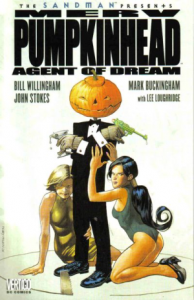
I still have that artist’s hankering, so I did do things like design the major characters artistically and things like that, but I couldn’t draw the whole thing. And Mark Buckingham, I’d worked with on the Merv Pumpkinhead job I did. He was a delightful artist, and he was a rare breed of artist- the kind that actually draws the story we agreed to do, rather than going ‘oh, I feel like drawing this today’. Wonderful, talented, inventive…at this point, he is the visual look of Fables, and I wouldn’t even try to impose a look over his work.
ZR: Although the Fables look is Mark’s, every ones in a while there’ll be something a bit more comicy, or more realistic, or a different style. Is that used only when it’s not a major story, or is there a technical reason for this?
BW: The real reason behind that is that Mark can’t do 12 issues a year. He can do 8, 9, sometimes 10 issues a year, depending on what other things he’s working on. He’s just a tiny bit too slow to do a monthly book. So, usually, 2 issues a year we need someone else to do a story. So we do specific stories for different artists. The nice thing about that is –though Mark is on record, he’d love to do all 12 issues- as a writer, I’ve wanted to work with other artists all the time. So these little interlude stories give me a chance to work with people I hadn’t worked with before. This isn’t Fables, this is House of Mystery, but I just got to write a Richard Corben drawn story. While I’m writing this, I’m saying to myself ‘Oh my god, I’m not good enough, this is Richard Corben’ same thing when I worked with Bernie Wrightson and Craig Russell and Charles Vess…James Jean did his first and only comic story, instead of covers, and I got to write it. I’m getting to work with some amazing, amazing people, and that’s one of the nice things about Mark not quite being able to do 12 issues a year. That said, he is such a genius artist…if he could do 12 issues a year, I would give up the love of working with other people – it would be just him. If I could formally adopt him, or get the country of Spain to just sell him to me, as property, I would.
SP: This is a rather big, thematic question…but do the Fables exist in and of themselves, or are they a personification of people’s attachment to them?
BW: So what you’re asking is- the biggest mystery of the Fables storyline, which I’ve been stringing out for years, and you want me to spill the beans.
SP: Yeah…Who Shot JR?
BW: The same guy that shot JFK. The concept is –even before Neil Gaiman or Terry Pratchett- what writers have called ‘Consensus Reality’ for a long time. A lot of talk of religion in science fiction and fantasy is that the belief in the god -or the character, or whatever it is- is what creates the power. Yeah, those are old, old, stories and I’ve always loved them. Consensus Reality – wonderful idea- whatever the most people believe in creates the energy. So, with Fables, Consensus Reality is probably the biggest theory right now on where they get their power and their immortality. There are characters in the story that are on record as saying that they don’t believe that that’s how it works. One of the questions that is raised in the series is –a good place to plug the novel that’s about to come out in a few days- the question of ‘Did the Fables exist before the stories, or did the stories exist, and create the Fables?’ and the answer is…I’m not gonna tell you.Yet. I know, and finding that out is going to be part of the saga.
SP: Though you have said that at the moment, you have no intention of stopping with writing Fables in the near future. So I guess the question is- is this revelation the end of Fables? Will this be the finale of the series or will there sill be life in the series after this revelation?
BW: Yes. Weirdly enough, when we started Fables, I knew what the very last story-arc would be, which is when the Fables finally go back to the homelands and overthrow the Adversary….
SP: …which we’ve already seen happen…
BW: Right. Then I got kind of tired of not getting to that story. It was growing stale in my mind. From the very beginning- well, 5th or 6th issues, I knew that the very last panel of Fables would be when Geppetto sits down in the office and signs the Fabletown compact. The problem is- I just really wanted to tell the story, but I did not want to quit doing Fables. So the obvious question is- what happens next? And if what happens next can be interesting, well, maybe we’ll do it. So I started thinking about some interesting things to do. So actually, the end of the war isn’t ever the end of the war -I don’t know if you folks in Israel realize the wars have lasting consequences, probably not- but sometimes that’s the more dramatic aspect of it. Paying the eternal price for what you’ve had to do. So, we went ahead and did the last Fables story, and then continued on, which I think brings you guys up to date with what’s happened. So there are going to be a number of big revelations, spaced over time, but hopefully, the series will keep on going.
SP: So, the nature of the Fables existence- that is not the last panel of the last book.
BW: No, no. I now know, yet again, what I think will be the last panel, if we ever need to wrap it up…
SP: Issue #500?
BW: That would be great. The most impressive run in comics so far from single creators is the 300 issues Dave Sim did of Cerebus, on a monthly basis. So it would be really, really, lovely –not that it’s a competition, except, everything is a competition- if I could just do at least 301 issues of Fables, and then the bus can hit me.
SP: That reminds me of what Steve Martin once said at the Oscars- they changed the line, when an award is presented, from ‘and the winner is’ to ‘and the Oscar goes to’. Because, god forbid, anyone should thing this is a competition.
BW: [laughs] Exactly.
ZR: It seems like several of the characters in the early books of Fables-
SP: -We read them in book form, rather than issues-
BW: …which is fine. Just a brief comment- the only problem I have with the books rather than the issues is that, although they were mostly designed to be in book form, there were occasional times where I put in cliff-hangers, where I wanted you to sweat out what’s going to happen. When you do monthly issues, that’s lovely, because a good writer will do evil things to his readers, he’ll really make them sweat things out. So when we did the collections, I asked if we could do a blank page in between each issue, and this page says that one is required to wait 24 hours before reading the next issue, just so that there’s a bit of that sweating it out. They said no, you can’t do that. At the moment it’s like ‘To be continued…right now’. With that thought, yes, I think of them as books as well.
ZR: Several of the characters in the first couple of books were presented as one-note jokes, but over the course of the series were fleshed out and given major roles. Were these character arcs planned in advance, or did they grow in the writing?
BW: Some I did plan, some of them won themselves a place in the spotlight. Let me give you some examples. Rose Red obviously was going to be a big important character from the get-go. She’s kind of been important, in the sense that she had that big important part in the first book, then she was a little bit in the background in the second story…not as prominent.
ZR: Well, she takes over the farm.
BW: Right, she has the big reveal, she takes over the farm. But while she’s running the farm, if the story isn’t taking place there, she’s a background character. She was always going to be more important, but only in the sense that we’ve got a big Rose Red story coming up, we just haven’t gotten to it yet. So here’s a character that started out important, kind of went into the background, but is going to be important again, and that’s all planned. So she went into the background, even though I had not planned that initially. Snow White, Bigby Wolf- always intended to be important. Blue Beard wasn’t intended to be important, but then I liked the idea of killing a villain off and making it stick, so he was important-important-important, then not very important at all.
SP: Prince Charming grows, too.
BW: Yeah, I wanted him to show us up.
ZR: I have no idea about the next one, but no one believes that Prince Charming is dead.
BW: Huh.
ZR: You didn’t show a body…
BW: That is right, I didn’t show a body. In traditional comic books, any time you don’t see the body, you know he’s still alive. Maybe I’m trying to say that these aren’t traditional comic books- I didn’t show you the body, yet he’s still dead. Or maybe…anyway. I’ll tell you this much. If it’s ever shown that Prince Charming is alive –and I’m not saying that he is- that will probably be the story that settles whether belief creates these character, or something else. Two background characters who created their own roles were Boy Blue- who was existed only because I wanted someone else in the office, so that Snow White would have someone else to talk to, and explain her important stuff to. But he grew into a bigger role. And, of course, Fly Catcher- the Janitor in the background, who was just comic relief, and yet, he became an enormous part.
ZR: That wasn’t planned?
BW: It was planned only in the sense that long before you guys had any inkling that he was going to become an enormous character, I knew it. I do try to plan these thing years in advance. So for almost two years, everyone in the Fables office knew what we were going to do with Fly Catcher, that he was going to become very important. But from day one? No, it wasn’t planned from day one in advance.
SP: Here’s a question that’s a bit more specific…you have all kinds of references to current events, or reality as we know it. Is there a clear demarcation line for you between the real and potent references –i.e. to Iraq or, of course, ‘The Israel Analogy’- and the more jocular ones- like the Young Republicans/ Nazis joke?
BW: The choice is always ‘what is most likely to make the most interesting story? Obviously I can’t know what’s the most interesting story for each and every reader, so I have to go with my own instincts. The joke about the Young Republicans marching? I thought that was a funny joke, so I put it in there.
SP: It’s doubly funny, because the joke is also on the ignorant, bleeding-heart liberals making the comment.
BW: What I love is, all my Republican friends thought I was dissing Republicans, saying stuff like ‘You’re supposed to be one of us!’, while all my liberal friends thought I was taking a shot at liberals. I think that if both sides are offended, I’ve done my job. So yeah, that was just a joke I liked. You don’t put in jokes that alter the story. That was a joke I could just put in, without affecting the story. The Israel comment was just a case of me wanting to have a good analogy as to what Fabletown had in mind, so that he didn’t have to make a 30 page speech. I wanted a little short-hand for the reader that says ‘we’re gonna be proactive in protecting ourselves because we’re the small guy against the overwhelmingly big guy’. It was a great analogy. I’m not just patting myself on the back here- the proof of analogy is everyone understanding what you mean by it. There was a miniature fire-storm about ‘how dare you drag your politics into this and shove it down my throat!’. What shoving? What was I doing? Did you understand the analogy? ‘Well, yes, but…’ That’s all I wanted! ‘well, I’m not sure you’re aware of the nuances…’ –as a matter of fact, I think there are a lot less nuances than you believe, but that’s not the point. Did you understand the analogy? Yes? Than in it was an appropriate thing to do in the story.
SP: Especially putting it in the mouth of Bigby.
BW: Of course, Bigby was just that kind of character. People accused me of using Bigby to voice my politics, when in fact, if I’m using all my characters to tell my politics, obviously I’m a Commie-Pinko, too, because I’ve got a character that spouts the party line. And I’m everything in between- I think that you should sleep with your sister, and, like the villain, I think that all worlds should be conquered and that I should be in control.
SP: Well, that’s very common.
BW: Right. But what I’m saying is, to pick a character or group of characters and say ‘this is the author’s mouthpiece’…I have very specific views, but in Fables, there’s no single character you can point to and say that’s me talking.
ZR: Does the term post-modern at this point make you sick?
BW: Oh, yes. Or, it did make me sick. Now it just makes me look at those people calling me that like ‘look at you, with your cute little word, trying to act grown-up’.
ZR: They must keep asking you that.
BW: Yeah. There’s this wonderful Zen, maybe Buddhist, parable where –and I’m going to really butcher it. A Simple man leads a simple life in his hut, tending his garden. Something happens, he comes into some money, gets more sophisticated, becomes more important in the village. The village gets absorbed into the empire, he goes to the capital and becomes an important person there, a counselor to kings and all that. Now he’s a great man, moving entire armies and navies about, making big decisions, and he’s getting wiser and wiser and more sophisticated. Eventually, he gets so wise, so sophisticated, so learned, that he realizes that the important thing in life is to be the guy in that hut tending the garden. Post-modernism is in there somewhere. You get concept like that, and that’s fine. But eventually, you’re gonna get wiser, and realize that that’s all just a bunch of hooey, that what this is about is telling good and interesting stories, and that’s the garden I want to tend.
ZR: It seems like with some of the characters, you take a famous character, and use certain known characteristics they have, and amplify it, making it into an actual power. Prince Charming, for instance, is not just dashing, but he actually has a power over women. How do you get from the concept of Prince Charming to your version of Prince Charming?
BW: A lot of ways. It’s different for each character. In Bigby Wolf’s case, the Big Bad Wolf was one of my favorite folklore characters. If I’d made him a villain, I’d only get to use him once or twice. But I didn’t want to do a book where the villain is just like Dr. Doom- coming back again and again and again and pretty soon he’s just a complete paper tiger, because every time he jumps out of the closet and goes ‘boo!’, you know that the heroes are going to beat him. So if I’d made him a villain, I’d have to kill him off and never see him again, and I wanted to play with the character more. So the decision to make him do a turnabout in his life and become a hero was an easy one to make. With Prince Charming, I just loved the idea that so many fairytales have that same character in them, so why not make him literally the same guy in each case? And if he really has found true love a dozen times, he’s got to be a womanizer, and how fun would that be? So sometimes, it’s just asking myself the question of ‘If I want this, what do I have to do to get it?’
ZR: I think my favorite character has to be Pinocchio…just the concept of an 8-year old saying ‘Hookers. My treat’.
BW: Pinocchio was one of those that I knew was going to be important eventually, but for a long time, it was just going to be that one joke premise. You know- ‘I want to grow up, I want to get laid, because the Blue Fairy took my wick too literally…I was going to be a boy for ever’. There’s something that’s always going to be funny about little kids cussing and doing adult stuff. Pictures of babies playing poker with cigars in their mouth are always going to be funny. I’m not sure why, but it always is. So it’s Pinocchio as this grumpy old man. He’s Walter Matthau, but in a little kid. That appeals to me endlessly.
SP: Wouldn’t he have had to have a big role? Since you must have known early on the role Geppetto was going to play.
BW: I knew someday he would be. I didn’t realize that he would get prominent so early, just because he was so fun to write. Originally, as most people know, I wanted the villain to be Peter Pan. We couldn’t use the character, because it was still copyrighted.
ZR: It’s a special law there.
BW: Right. It’s a special law to keep the hospital funded with the royalties. So when I couldn’t do Peter Pan, I looked around for another character to be the villain. And it had to be a well-known character, so that people would go ‘Oh my god, he’s the villain’. I considered many, but going down the list, when I got to Geppetto it seemed perfect. The Puppet-master! I think the second script of Fables had already been written at that time. So before you guys saw the first issue, we knew that Geppetto was going to be the villain. Even though that one page scene with Pinocchio had already been planned, that’s when we knew that Pinocchio was going to have a bigger role- if Geppetto is the villain, of course Pinocchio is going to be important.
SP: This is a bit of a tangent, but are Jack’s episodes in Hollywood in any way based on experiences you’ve had?
BW: I’ve been to Hollywood a few times, when there were aborted attempts to make a movie of Fables. It was with Jim Henson pictures, with Lisa Henson and Jennette Kahn, who has Double Nickel Entertainment. She used to be the publisher of DC Comics, and went and formed her own production company. So they teamed up and were going to do Fables, and they loved Fables.
ZR: Would it have worked as a standalone feature?
BW: We’ll never know. Well, maybe we will, someday. They invited me out, because they were going to work hand-in-glove with me to make sure that the project would stay true to its source material. And I expected what one hears about Hollywood- it’s an evil, terrible town, everyone is a bastard, you’ll spend the entire time stuck in traffic, etc. Well, I went out there a couple of times, and, for one thing, everyone at Jim Henson Pictures was just wonderful to me. So polite, so nice, so generous. That was one image destroyed. And I never got stuck in traffic, not once. Many of my Hollywood visions were punctured because of this. But then, the project fell through, and I began to learn how Hollywood really works. That it takes an act of god- a series of miracles, not just one- to get something made, and anywhere along the way, total idiots can say no and kill things. That’s when I came to believe that I didn’t believe that any film actually has been made, ever, because it can’t be. Therefore, everything we think we’ve seen is just a figment of our collective imaginations.
SP: …coming back to the main theme of Fables.
BW: Exactly. Consensus reality, or consensus wishful thinking. But I don’t see how anything could be made in that system. Let me give you an example. Fables had been shopped around as a movie and as a tv series several times, and for a time I was following it closely. ‘Fables just landed at NBC’ –I don’t know, just as an example. There’s a guy there, an executive, who absolutely loves it. This is going to happen. Well, that guy is a player, he’s going places. No one in Hollywood stays at the same job for more than six months, it seems. So just as this guy is about to get things going on Fables, he gets a new job at a new studio. He can’t take Fables with him, and someone else at NBC has his old job. That guy looks at all this stuff on the desk that was just about to go into production, and he says ‘Kill it all’. He says that because it’s a no-win situation for him. If they do well, that other guy gets all the credit. If it flops, he gets the blame. So there’s no possibility that he’s going to let that go ahead. He’s going to get his own new projects, get them almost into production, and then the next guy will kill them, too.
BW: ABC, the last I’d heard, had reached an agreement with DC Comics to do a series called Fables. A pilot has been written. I’ve read that script.
ZR: Are you happy with it?
BW: We’ll get to that. Let’s back up one more bit. One of the problems with something this big, is you have millions of people involved, it seems like. Everyone seems to think that someone else is keeping me informed, so I’m often the last to hear. It’s not a diabolical scheme- everyone just assumes that everyone knows. So my information may be months out of date. But last I’d heard, ABC had a pilot written. The way it works is, once you have the pilot written, you shoot that, test it, then decide whether you want to continue the series. We’re at the stage where the pilot was written, but has not been made. I think. It’s stuck at that stage, because the studio wasn’t that happy with the script, they wanted revisions. The problem is, pilots are only made at a certain time of year. So if you do too much revising, you’ve missed the window of opportunity this year. Because of that, a thing can be in limbo for a long time. I believe it’s stuck at that stage of limbo. They say they’re going to do it. And the answer on the script thing is I’m not directly involved in making these decisions. It was a courtesy that they let me read the pilot, but on the condition that I’m not to comment on it one way or another. So I would love to be able to tell you what I thought, but I’m not going to.
ZR: I guess the biggest question remaining is why did Jack specifically get his own series?
BW: Well, I wanted to do the Hollywood Jack story, because he seems the time…he believes in consensus reality. He believes that if he becomes the most popular Fable, he’ll become the most powerful Fable. And the only way that that could happen is if he gets in trouble and gets kicked out of Fabletown. I wrote that line ‘and he was never seen in Fabletown again’. I thought it was a cool line. And then I thought, I wonder what happens next to him? And Shelly Bond, the editor, thought the same thing- ‘I wonder what happens next to him?’, which is a wonderful question. As long as the readers can keep asking that, we’ve still got a career. So we kind of mutually decided to show what happens next, and for that reason alone, decided to spin-off the series.
SP: You didn’t think ‘Oh crap, what have I done by banishing this character’?
BW: Well, I left myself an out. I knew Jack could be back in general series, because all I said was that he was never seen in Fabletown again. He could be in the Farm, or anywhere else, for that matter.
ZR: Totally technical question: Why is Mowgli a western Fable, whereas Aladdin is an Eastern one?
BW: Because Mowgli –and this is not an answer to the consensus reality thing- was actually invented by an Englishman, and he wrote it in America. As a matter of fact, Mowgli was created on a desk in a mansion in Vermont, which I got to rent when I started writing Peter & Max. So Peter & Max was largely written –about a third to half of the novel- was written in the same room, on the same desk, that Kipling invented Mowgli. So in my mind, I see him as a western character, even though it’s about an Eastern character.
ZR: It seems to me like just about every public domain character that could be put in there is in there. Do you think one day in the future someone will see today’s Wolverine, Superman, and everyone else as Fables?
BW: I think it’s inevitable. The wonderful thing about public domain characters is this: Everyone owns them. Let’s say Superman went into the public domain. You could do your Superman story, I could do mine, and they could all be different. Mine could be a super criminal, General Zod, Master of the world type; whereas yours could be a nice guy living in the Midwest with his childhood sweetheart…anyone can do anything with it. I love that- that’s what I love doing the Fables characters. The decision of what characters get used in Fables is: Are they in the public domain, and can I think of a fun story to do with them, and that’s it. Those are the two requirements.
SP: Thank you so much for doing this.
BW: Thank you!
Bill Willingham’s participation in ICON 2009 was sponsored by The US Embassy and Kamikaze Comics.


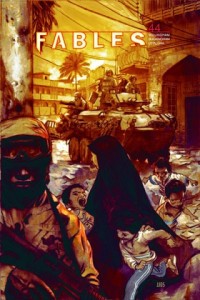
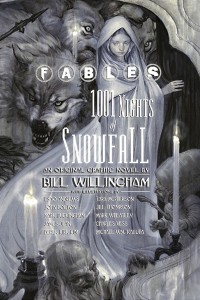
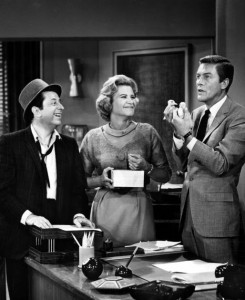
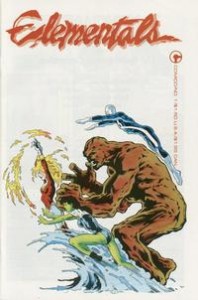
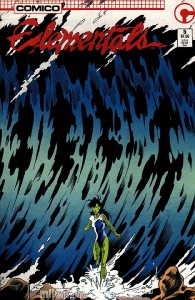

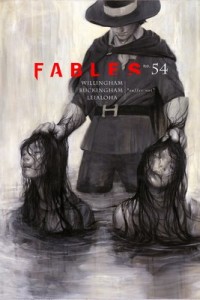
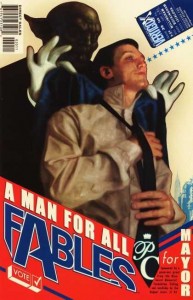
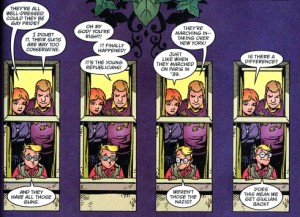




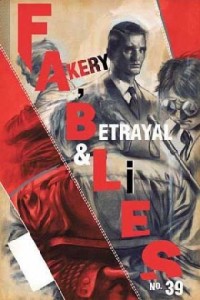





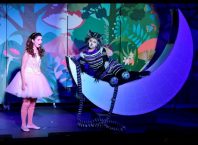


Simple, Shlomo and I don’t just like Fables, we love it ever so gently -and make it breakfast the next morning.
Far out, and flat-out the best Willingham interview I have ever come across.
Now how did this end up in a blog so un-comicish?
Comments are closed.